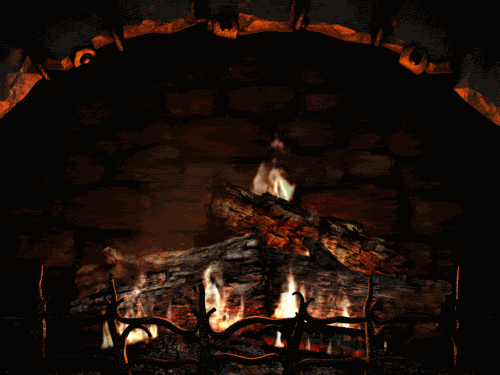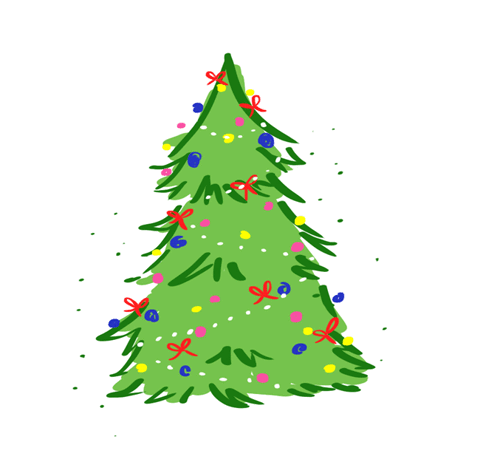15 Forgotten Christmas Words to Make Your Holiday Merry
Are we too late? Or perhaps right on time. Possibly… but it’s that time of year again. For all those language lovers out there, have a sit after all the gift unwrapping is said and done and take in a little Christmas linguistics fun. Here are some long and perhaps not-so-long forgotten words associated with Christmas, as well as the true meaning of some those you already know; your task is to decide which you’ll adopt this festive season, and which you’ll now look on in a different light!
Photo via Giphy
1. Christmas
Okay, you know this one already, but did you know that the word derived from the word Cristemasse, as an abbreviation of the word first used back in 1038? No, neither did we… the word Christ comes from the Greek word Χριστός, or Christós, and mas is just a shortened mass derived from the Latin word missa, which is essentially a dismissal; priests would utter the words ite, missa est meaning go: it is the dismissal at the end of their Masses.
2. Gawby-Market
Here’s your first forgotten word: a gawby, or gaby, is an 18th century word for a fool or simpleton, and a gawby-market is the fair or market held on the first day of trading after Christmas (does that make all of us who queue up for Boxing Day sales gawbies, then?)
3. Rumball
Yes, as well as these festive sweet treats that tend to turn out a little potent when homemade, a rumball is also a feast that’s served the day before Christmas. In fact, Rumball Night is the old 18th century nickname for Christmas Eve.
4. Yule-Skrep
Children misbehaving during Christmas was once such an offensive thing to do, that those smacks given to a child for their misdemeanours—not that we condone such things, of course—had its own name. At least in the Shetland Islands it did; the yule-skrep! Was a regular everyday smack a skrep then? Enquiring minds want to know (but not to use, naturally)!

Photo via Giphy
5. Yule
While we’re on the subject of yule then. We might commonly think of a chocolate dessert when we hear the phrase Yule log, but traditionally this was a log burned during the Twelve Days of Christmas (December 25-January 6). It is thought that the word yule means revolution or wheel, symbolising the cyclical nature the sun.
6. Yulestarn
And another yule-related word. A Yulestarn is a noticeably bright star in the sky appearing on Christmas night.
7. Yuleshard
Our final yule offering; a person who doesn’t receive new clothes at Christmas is referred to as a yuleshard. Christmas sweaters are a good thing, then!
Learning a new language? Check out our free placement test to see how your level measures up!
8. Boun
To boun something is decorate it with evergreen branches during the Christmas period.
9. Evergreens
And while we’re on the subject of evergreens; this word derives from the Old English word
aefie meaning always, and gowan which means to grow. Evergreens have been symbols of eternal life and rebirth since ancient times, and pagan use and worship of evergreen boughs and trees has evolved into the ‘Christian’ Christmas tree. And by evolved from we naturally mean stolen.
10. Bull Week
You have to love all the nuances of the Yorkshire dialect (you don’t have to, it’s an educated suggestion). Bull week is a Yorkshire word for Christmas, which in today’s world might sound a little odd. But during the 1800s, workers in Sheffield’s cutlery factories were rewarded with a whole roast bull if they finished all the additional pre-Christmas work on schedule for Christmas Day.
11. Ramracketting
According to the English Dialect Dictionary, ramracketting means Christmas gambols. To gambol is to run or jump about playfully—although in Birmingham, a gambol is also used as alternative word for somersault.
12. Merry-night
This is an 18th century word for a party held in pubs at Christmas.
13. Bummock
A bummock is an old Scots word that describes a large quantity of drink brewed specifically for a special occasion, and in particular at Christmas. In the 18th century a bummack, or bummock, was also the name of a party held for tenants by their landlords at Christmas.

Photo via Giphy
14. Mistletoe
Not that we wish to put you off all those Christmas kisses you might be anticipating, but mistletoe is from the Anglo-Saxon word misteltan, which means little dung twig, because the plant spreads its seeds though bird droppings. Not quite as romantic as you’d imagine.
15. Crawmassing
A great word to finish with! When gathering up or going through the remnants of a Christmas meal—in other words, all those little bits of leftovers that most people would discard, this is called crawmassing. It may originate from the word comassing, which refers to someone who begs for food at Christmas from their friends or neighbours.



